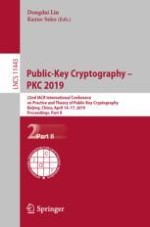2019 | OriginalPaper | Buchkapitel
Safety in Numbers: On the Need for Robust Diffie-Hellman Parameter Validation
verfasst von : Steven Galbraith, Jake Massimo, Kenneth G. Paterson
Erschienen in: Public-Key Cryptography – PKC 2019
Aktivieren Sie unsere intelligente Suche, um passende Fachinhalte oder Patente zu finden.
Wählen Sie Textabschnitte aus um mit Künstlicher Intelligenz passenden Patente zu finden. powered by
Markieren Sie Textabschnitte, um KI-gestützt weitere passende Inhalte zu finden. powered by
